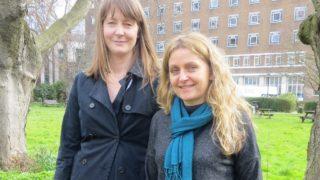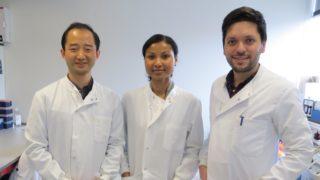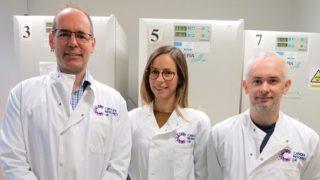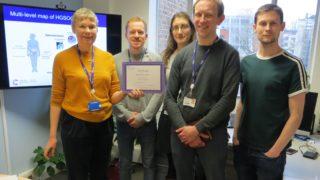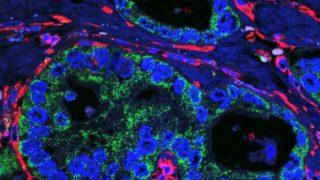Category: Publications
Search News
Categories
Archives
BCI and KCL collaboration develops a clinically-relevant CAR T cell imaging system
19th April 2018
A collaboration involving researchers from BCI’s Centre for Molecular Oncology, led by Dr Jane Sosabowski, and the ImmunoEngineering Group of King’s College London (KCL), led by Dr Sophie Papa, has developed an effective and clinically-relevant imaging system to monitor chimeric antigen receptor (CAR) T cells within the body. This system reduced the tumour burden in a pre-clinical model of prostate cancer and allowed for repeated and non-invasive assessment of CAR T cell localisation.
Read moreDetermining the mechanisms of response and resistance to treatment in bladder cancer
29th March 2018
A worldwide collaboration involving BCI’s Prof Thomas Powles, Centre for Experimental Cancer Medicine, has revealed mechanisms involved in the development of response and resistance to an immune checkpoint inhibitor in metastatic urothelial cancer. The findings may highlight ways to improve the efficacy of this treatment in the hope of achieving long-term remission for patients.
Read moreFollicular lymphoma marked by spatial tumour heterogeneity
23rd March 2018
A research team at the BCI, Queen Mary University of London, led by Dr Jessica Okosun, Centre for Haemato-Oncology, has found that tumours at different sites within the same patient with follicular lymphoma can be genetically diverse. This suggests that a sole biopsy is incapable of capturing all the genetic events in any given individual and presents a significant challenge when providing targeted therapies to treat this disease.
Read moreSwitching on survival signalling to drive drug resistance
27th February 2018
Researchers at the Barts Cancer Institute (BCI), Queen Mary University of London, led by Dr Richard Grose, Centre for Tumour Biology, have discovered that the loss of a single protein- PHLDA1- is sufficient for the development of drug resistance to a type of targeted therapy in endometrial and HER2-positive breast cancer cells.
Read moreThe involvement of the microenvironment in tumour evolution
15th February 2018
For the first time, researchers at the Barts Cancer Institute (BCI), Queen Mary University of London, have profiled what happens at the site of tumour metastasis as cancer grows and develops. By looking closely at the tumour microenvironment (TME), the team led by Professor Fran Balkwill, Lead for the Centre for Cancer & Inflammation, has identified changes that occur as a type of ovarian cancer evolves.
Read moreSteps towards the development of a new immunotherapy for pancreatic cancer
23rd January 2018
A research team led by Professor Yaohe Wang at the Barts Cancer Institute (BCI) of Queen Mary University of London (QMUL) has created a novel oncolytic viral agent expressing interleukin-12 (IL-12) that shows promise as a potential anti-tumour immunotherapy for the treatment of pancreatic cancer.
Read more
